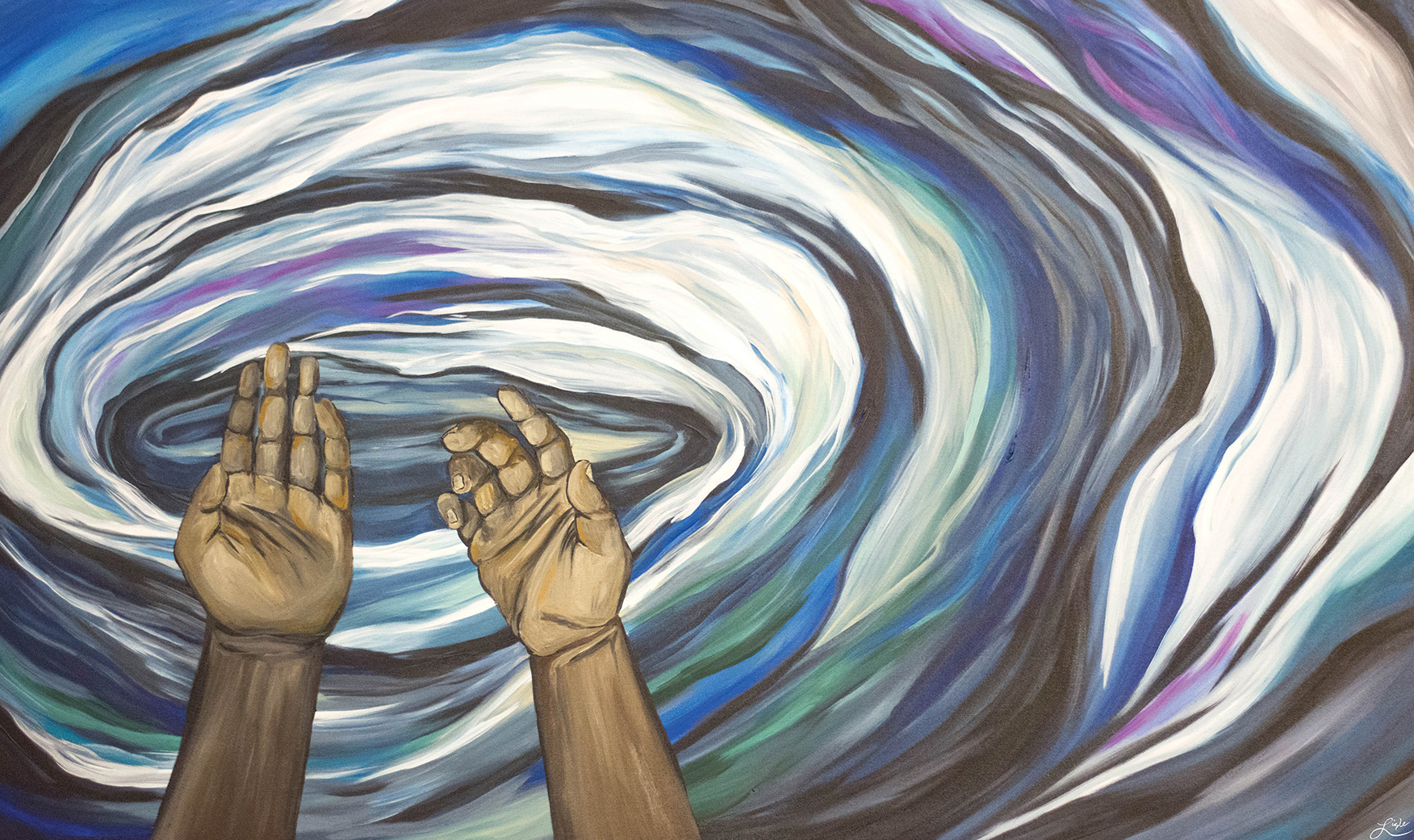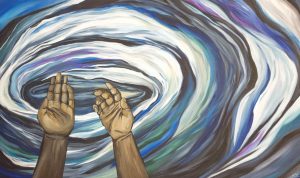
The Ripple Effect: How One Drop Changes Everything
One early evening on a lonely country road, an old man was standing on a bridge, high above a deep river. He had just dropped a pebble over the railing to see how long it would take to hit the water.
As he watched the ripples fanning out, along came a pickup truck. It slowly came to a stop, but the motor kept running. The old man noticed the name painted on the door: Jack’s Greenhouse Nurseries. Walking up to the window, he saw a man behind the wheel with his head bowed low, breathing heavily.
“Is anything wrong?” he asked.
“Yes,” the man said quietly, “I think I am having a heart attack. I’m trying to get to the hospital.”
“Let me help,” said the old man. “You shouldn’t be driving. The hospital is a good ten miles from here.”
“I know,” mumbled the man. “I’m Jack. I’m a widower. I was all alone at my nursery, after my employees had left for the day.”
“Don’t worry, Jack,” said the old man. “I’ll drive you there.”
He opened the door, took the wheel, and drove as fast as he could down the road. When they arrived at the emergency entrance to the hospital, the attendants rushed out with a wheelchair and quickly wheeled Jack to the emergency room.
The old man waited throughout the night. He knew what it was like to be all alone, without family or friends in times of need. He, too, was a widower. He had lived alone since his wife had died several months before.
The doctors were able to save Jack’s life. They told the old man that Jack would have died if he had arrived just a few minutes later.
A week passed. Jack was getting well. Several of his employees came to visit, as did the old man. While everyone was gathered around his bedside, Jack took the hand of the old man and said to his employees, “This dear and gentle man saved my life, even though we were perfect strangers. And I want you to know, he created a ripple effect in all of our lives. By saving my life, he saved my business. By saving my business, he saved the jobs of thirty families. We all owe him so much.”
There was silence as all eyes turned toward the old man. He gave a gracious smile, but there were tears in his eyes. He gently leaned over the railing of the bed and whispered to Jack, “I have to tell you something, Jack. You saved my life. Just about the time you drove up in your truck, I was about to jump off that bridge. Now I know how important every life on earth is to every other. It is just as you said, Jack, the ripple effect.”
Is this story true?
I have no clue! But isn’t it likely to be true. Don’t you know deep down that these sorts of things happen all the time. Maybe not this dramatic. Maybe not even life and death. But our lives have a tremendous effect upon one another. Everything you say or do starts as a tiny ripple and has the potential to create massive waves upon your own life or the lives of others.
How do I know this, well, first I have experienced it in my own life. And second, to quote an old children’s song, “for the Bible tells me so.”
The Bible shows us this truth in many places. And I wAnt to look at one of those today. One that isn’t the most popular or well told story. Those are the kinds of stories we are looking at after all in our summer series called Faces of Our Faith.
Today, it’s the story of Shiphrah and Puah From Exodus 1.
Now a new king came to power in Egypt who didn’t know Joseph. (Pay attention to that!) The king said to his people, “The Israelite people are now larger in number and stronger than we are. Come on, let’s be smart and deal with them. Otherwise, they will only grow in number. And if war breaks out, they will join our enemies, fight against us, and then escape from the land.”
As a result, the Egyptians put foremen of forced work gangs over the Israelites to harass them with hard work. They had to build storage cities named Pithom and Rameses for Pharaoh.
But the more they were oppressed, the more they grew and spread, so much so that the Egyptians started to look at the Israelites with disgust and dread. So the Egyptians enslaved the Israelites. They made their lives miserable with hard labor, making mortar and bricks, doing field work, and by forcing them to do all kinds of other cruel work.
So whats’s going on here? This story describes the creation of the Egyptian nation’s policy of enslaving Israelites. And it tells us exactly how and why this policy got put in place.
So tell me, who created the policy?
Answer: Egyptian king (pharaoh)
And why did he do it?
Answer: He was afraid of the Israelites.
Why was he afraid?
Answer: He didn’t know them and they were growing in strength and number.
Interesting. A new king comes to power. And he does not know Joseph, the representative of Israel who was second in command under the previous king. Joseph is symbolic of all of Israel. Without relationship this new king is afraid. He begins to speculate about the people he didn’t know (of course I suspect he thought he knew them perfectly well – we always believe we know people that we think ill of, right?). Well, his speculation leads to fear. And fear leads to harassment. And harassment leads to enslavement. There is a ripple effect here, right? Not a positive one to be sure, but a ripple effect which starts with the small actions of a new leader who comes to power.
And think about it: How could that ripple effect have changed if this leader would have started the ripple with the hand of fellowship instead of fear and speculation? What if he say down with people first and listened to them, learned from them? Things could have been like they were when the king DID know Joseph. But this ripple starts with fear and speculation and ends in enslavement.
So let’s recall again know what happens next…
The Egyptian king calls 2 midwives Shiphrah and Puah together in secret and tells them to kill Israel’s baby boys as they are born. Not for everyone to see, just in secret so no one knows.
But Shiphrah and Puah’s allegiance was to God and not the nation of Egypt. So they disobey the king. It’s a little nonviolent civil disobedience that I expect folks like MLK would be proud of!
The king eventually learns the boys aren’t being killed. He calls the midwives back in and questions them about the plan: “What’s going on? Why aren’t you following my order?”
Now, just imagine with me a moment. Shiphrah leans over to Puah and says, “What are we gonna do?”
Puah looks frightened at first . But then a sly smile creeps across her face.
She whispers, “What is it old phraroah is afraid of?”
Shiphrah, squints her eyes not understanding where Puah is headed with this thought: “everybody says he’s afraid of how strong and numerous we Israelites are.”
“Right,” Puah says, “so we use that against him!”
And she turns back to pharaoh and proclaims, “It’s not that we are letting them live. It’s because the Hebrew women are not like the Egyptian women; they are strong, healthy, vigorous and so full of life that they give birth before we can even get to them. By the time we arrive, there’s nothing we can do secretively. And you don’t want your plan exposed, do you?”
This is hilarious! In the midst of an Egyptian national program of mass genocide of Hebrew children, these two Hebrew women stand up to the Egyptian ruler in the most brilliantly rebellious way using his fear against him!
You see the irony, right? Pharaoh is trying to extinguish life and suppress the strength of a people, but the Hebrew midwives say that they are so full of life that the plan isn’t working!
The very thing that pharaoh fears is the reason his plan isn’t working!
Can you just imagine the look on Pharoah’s face?! Probably horrified, scared, frustrated and mad…..all at the same time!
Yet what can he do to these midwives? According to them they are trying, but they cannot get there fast enough. They are complying with the command (so they say at least).
The story says that God dealt well with Shiphrah and Puah. And that through their actions the Hebrew people grew stronger, more powerful and even more numerous…all whiles slaves to the Egyptians.
Pharaoh ends up eventually trying again another way. He gets bold and things get bad. Instead of being secretive on the birth stool through the midwives, he commands all Egyptians to throw Hebrew boys into the Nile.
And you know, of course, what this leads to: the story of Moses! So it was Shiphrah and Puah that cast the pebble in the water creating a ripple the expands into Israel’s greatest leader.
And you might even remember another time when this ripple is at work. Moses isn’t the only baby born into a time of a leader enacting child genocide. A Roman provincial king learns from pharaoh and enacts the same policy when wise men from the east disobey his orders to bring him news of a newborn baby born to be king of the Jews.
This story is eerily familiar, isn’t it! Instead, of wise midwives, this story has wise magi. Instead of pharaoh it’s Herod. Instead of Moses, it’s Jesus.
Those two brave midwives, Shiphrah and Puah set events in motion that pave the way for not one but two of the greatest leaders of our faith. Their small act of rebellion sets of a ripple that continues for hundreds of years and brings about not just a wave, but a tsunami of salvation through the birth of God’s son.
Brothers and sisters, you never know the impact of one small act – good (like the midwives) or bad (like the new Egyptian king). What you can be sure of is that everything you do works within the world of cause and effect. One thing leads to another. You have the power to creates ripples for good…..or bad. Every day you wake up. Every time you go to work or volunteer. With every dollar you spend or donate. With every word you speak. Every hand you shake. Every time someone asks you to do something you know is wrong. Every time someone comes to you in need of help or assistance. In everything, we set ripples in motion.
Will your ripples be like those of Shiphrah and Puah, midwives of their people? Or like those of a king who speculated about people he didn’t even really know?
In this story it’s the relationships that are the key to setting of ripples for good. What will it be for you?
Hold you hands out in front of you. There is great power in your hands. Power to say yes and power to say no. Power to effect change. Power to hurt or harm…or to help and to heal. Power to act out of fear…or out of kindness and love. What ripples will you create with your hands, your heart, you mind, your soul?
* The image for this week comes from A Sanctified Art and is titled They Said No by Lisle Gwynn Garrity

